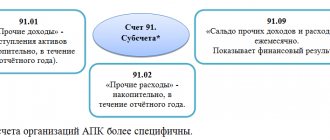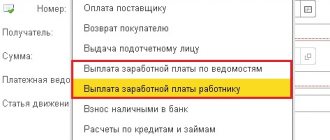Account 91 “Other income and expenses”
Income receipts from sales and expense transactions related to the main activity of the enterprise are subject to reflection in accounting account 90 “Sales”.
But income and expenses from other activities cannot be reflected on the sales account. In accordance with Order of the Ministry of Finance No. 94n, such transactions should be accumulated in a special account 91 in accounting. Let us remind you that other types of operations include the following:
| Income | Expenses |
|
|
Accounting account 91 is intended to reflect income from other types of credit activities and debit expenses.
When can VAT be included in expenses?
We said earlier that VAT cannot be taken into account in a company’s expenses. There are, however, exceptions to this rule. In some cases, it is not possible to claim VAT for deduction, but it is possible to write it off as expenses (according to the text of Article 170 of the Tax Code of the Russian Federation, paragraph 2.5, Article 169-3(1), letters of the Ministry of Finance No. 03-07-07/72 dated 02/11/10, 03-07-08/195 from 01/10/09, 03-11-06/3/227 from 03/09/09):
- The VAT amounts actually paid at the time of import of goods into the territory of the Russian Federation, if they will be used, in turn, in the production of tax-free goods. The same applies to works and services.
- Amounts of VAT on purchased goods, works, services, if they are subsequently used in production or sales outside the Russian Federation.
- The company is in a special regime and is exempt from paying taxes. Here you need to keep in mind that invoices may not be issued to such companies upon purchase, however, provided that an agreement on this is concluded between them and the seller.
- The acquisitions will be used in operations that are not sales under the Tax Code of the Russian Federation.
- In certain cases of the Tax Code of the Russian Federation, VAT is included in the profit costs of banks, pension funds (non-state), insurance companies, clearing firms, stock market participants, etc.
When creating transactions, it would be correct to first allocate VAT and then charge it to expenses.
Example
The company purchased raw materials for the production of goods for export in the amount of 240,000 rubles, including VAT 20%
Postings:
- D10 K60 — 200,000 rub.
- D19 K60 — 40,000 rub.
- D10 K19 — 40,000 rub.
VAT is fully included in the cost of goods and materials.
Attention! VAT on expenses under the simplified tax system “income minus expenses” is reflected only after the sale of an asset or product (Articles 346.16, 346.17, letter of the Ministry of Finance No. 03-11-09/6275 dated 17/02/14).
Account details 91
For additional detailing of analytical accounting for business operations from other types of activities, the opening of special sub-accounts is provided:
- 91-1 “Other income” (PD);
- 91-2 “Other expenses” (PR);
- 91-3 “VAT”;
- 91-9 “Balance of other income and expenses.”
Please note that, taking into account the specifics of the company’s activities, additional sub-accounts may be opened. So, for example, you can further detail account 91-2 by type of other expenses. However, such a decision must be fixed in the accounting policies of the organization.
Expired statute of limitations for tax deduction
The law sets a 3-year period when input VAT can be deducted. There are situations when it was not possible to reflect the tax deduction for this period (for example, the absence of an invoice from suppliers). In this case, the amount of VAT claimed is included in other expenses on account 91.
Also, the assignment of VAT (but not input VAT, as in previous cases, but already accrued for payment to the budget) to account 91 when the statute of limitations expires is carried out when writing off accounts payable to the customer for the advance payment received from him. According to Russian legislation, upon receipt of advance payment, the supplier is required to issue an advance invoice. According to the issued document, the tax accrued for payment is reflected in account 76 “Advances received”. VAT can subsequently be deducted from the specified account: when selling goods or when returning funds to the counterparty. If the 3-year limitation period has passed and the debt is written off, the VAT amount is written off simultaneously with the debt to account 91 to the corresponding sub-accounts: the debt to the counterparty relates to the income of the organization, presented with advance payment of VAT - to expenses:
- Dt 62.2 Kt 91.1 - accounts payable to the customer are written off;
- Dt 91.2 Kt 76 “Av. floor." — VAT previously paid to the budget from the advance received is written off.
Typical accounting entries 91
Let's consider the main accounting entries for reflecting business transactions with other income and expenses:
| Content | Debit | Credit |
| Receipt of PD to settlement accounts or to the company’s cash desk | 51 50 | 91-1 |
| PD for settlements with customers is reflected | 62 | 91-1 |
| PD for settlements with various debtors and creditors was taken into account | 76 | 91-1 |
| Value added tax is charged for other transactions | 91-3 | 68 |
| Reflected PR upon disposal of fixed assets | 91-2 | 01 |
| DP taken into account when disposing of inventories or raw materials | 91-2 | 10 |
| Accepted for accounting of PR for settlements with suppliers and contractors | 91-2 | 62 |
| Disposals from the company's settlement accounts for PR operations are reflected | 91-2 | 51 |
Note that accounting account 91 at the end of the reporting month should not have any balances, that is, this accounting account should be closed.
VAT is highlighted in the receipt document or receipt, but there is no invoice
Often, when purchasing goods or services for cash, situations arise when the VAT amount is highlighted as a separate line in the shipping document (cash register receipt, invoice or act). At the same time, at the time of posting the advance report, it is already clear that for some reason there will not be an invoice for the receipt document or the amount of tax is not so large that it makes sense to waste time on receiving it. Such VAT cannot be deducted. Therefore, immediately at the moment such amounts are identified, the tax must be written off directly or through account 19 to account 91.
Read more about such situations:
- “VAT deduction without an invoice: new clarifications from the Ministry of Finance”;
- “What to do with VAT if goods are purchased at retail and there is no invoice?”
In some cases, “input” VAT cannot be deducted, but can be taken into account in income tax expenses. Which ones exactly, ConsultantPlus experts explained. To do everything correctly, get trial access to the system and go to the Ready solution. It's free.
How to close account 91
At the end of the reporting month, the other expenses account (account 91) should not have a balance either in debit or credit. Therefore, on the last day of the reporting month, an accounting entry should be generated that closes accounting account 91, with the difference in business transactions assigned to the profit and loss account.
Accounting entry, how to close 91 accounts:
- If a profitable (positive) balance has been formed for other transactions, entry Dt 91-9 Kt 99 is drawn up.
- If an unprofitable (negative) balance is identified based on account turnover for the month, then the accountant must reflect the posting Dt 99 Kt 91-9.
At the end of the financial year, before preparing financial statements, it is necessary to check the closure of all sub-accounts of 91 accounting accounts.
Operations with features of transfer of ownership
An asset purchase and sale agreement may provide for a special transfer of ownership of the property after full payment for the goods. At the same time, the supplier transmits closing documents, including an invoice, upon actual shipment of the assets.
In such a situation, difficulties arise with accepting tax as a deduction. In fact, the property has been shipped, receipt documents have been provided, the goods have been capitalized (accounting is carried out on off-balance sheet accounts before the transfer of ownership). On the other hand, the goods have not yet become the property of the organization, and therefore questions may arise from regulatory authorities. Based on this, it is more expedient to leave the VAT “hanging” on the debit of account 19, and after transferring the payment, accept it for deduction. If suddenly the organization did not have time to pay its supplier, and the latter was liquidated, then it will need to include VAT from account 19 to other expenses: Dt 91 Kt 19.
Double entry rules
Many accountants are convinced that the rules of double entry are established by the Instructions for the Application of the Chart of Accounts, approved by Order of the Ministry of Finance of Russia dated October 31, 2000 No. 94n. Meanwhile, according to the conclusion of the Russian Ministry of Justice, this document does not require state registration. This means that you do not have to follow the instructions literally.
In the Instructions, after the characteristics of each synthetic account, only a typical scheme of its correspondence with other synthetic accounts is given. If facts of economic activity arise, correspondence for which is not provided for in the standard scheme, the company can supplement it, observing the uniform approaches established by the Instructions (letter of the Ministry of Finance of Russia dated October 6, 2015 No. 07-01-06/56934). At the same time, financiers explained that the Instruction is not of a regulatory nature (letter of the Ministry of Finance of Russia dated March 15, 2001 No. 16-00-13/05).
note
Letters are not normative legal acts and cannot contain generally binding instructions (resolution of the Ninth Arbitration Court of Appeal dated April 23, 2014 No. 09AP-10577/2014).
So, contrary to its formidable name, the Instructions for using the chart of accounts are not a dogma. Moreover, it is not prohibited to introduce new synthetic accounts and there is no need to coordinate such a decision with the Russian Ministry of Finance.
As a result, the rules of double entry must be sought in the Regulations on Accounting and Accounting Reports in the Russian Federation (PVBU) and in the PBU (as well as in the Methodological Instructions adopted for them), registered with the Ministry of Justice of Russia. In this case, the rules of the PVBU should be followed only if otherwise is not established by the PVBU (clause 32 of the PVBU).
Rule Sources
So, the accounting rules contain only those orders of the Russian Ministry of Finance that have passed state registration. And if the Russian Ministry of Justice recognized the order as not requiring state registration, then it is only advisory in nature.
A modern accountant must have a clear understanding of what a regulatory legal act is. This is a written official document adopted (issued) in a certain form by a law-making body within its competence and aimed at establishing, amending or repealing legal norms. In turn, a legal norm is usually understood as a generally binding state regulation of a permanent or temporary nature, designed for repeated use. The source of this definition is the Explanation of the Application of the Rules for the Preparation of Normative Legal Acts of Federal Executive Bodies and their State Registration, approved by Order of the Ministry of Justice of Russia dated May 4, 2007 No. 88 and registered therein.
However, even the orders of the ministry registered with the Russian Ministry of Justice do not establish rules if they contradict the federal law “On Accounting”. This clarification is contained in Information of the Ministry of Finance of Russia No. PZ-10/2012.
Punishment for a mistake
Now let's look at the problem of incorrect, or more precisely, non-standard entries from the other side: what are the sanctions for an error?
Incorrect reflection of objects on accounting accounts threatens the company with fines under Article 120 of the Tax Code (in the amount of 10,000 rubles). However, you shouldn’t be “scared” ahead of time. Erroneous postings in themselves are not a gross violation entailing liability under this article. Grounds for bringing to responsibility arise only when a combination (simultaneous fulfillment) of the following conditions: “systematic (twice or more times during a calendar year) ... incorrect reflection in accounting accounts, in tax accounting registers and in reporting of business transactions, funds, material assets , intangible assets and financial investments.”
So, in order for a company to be fined under this article, the accountant needs, in addition to two errors in the accounting registers, to also make two errors in the tax accounting registers, as well as two errors in the financial statements, and within a calendar year.
So, if an accountant makes two errors in the correspondence of accounts for similar transactions, then he will distort only one reporting item. But if a company prepares reports once a year – as of December 31, then Article 120 of the Tax Code “will not work.” After all, an error in financial statements will be one-time. But if one of these errors appears in interim reporting, then a tax penalty cannot be avoided. However, tax inspectors are not keen on identifying such mistakes.
Another sanction for accounting errors, but for officials, is provided for in Article 15.11 of the Code of Administrative Offenses. But it does not follow from it that incorrect entries themselves give rise to gross violations of accounting requirements. This offense includes distortions of any financial reporting indicator expressed in monetary terms by at least 10 percent. The cause of the distortion does not matter.






